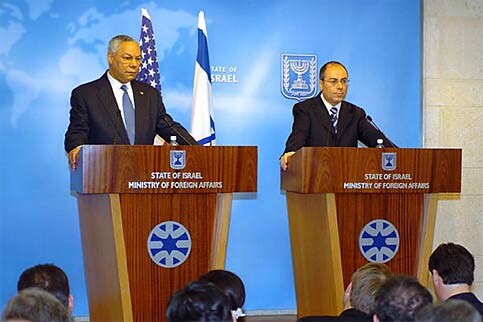The Electronic Intifada 17 December 2004

Secretary Powell and Israeli Foreign Minister Silvan Shalom speak to the press in Jerusalem. Secretary Powell traveled to Israel and the Palestinian territories on November 21-22. (Photo: State Department)
The steady flow of international dignitaries to Israel and Palestine following the confirmation of the new transitional Palestinian leadership has been rather impressive. Outgoing US Secretary of State Colin Powell, outgoing UN envoy for the Middle East Terje Roed-Larsen, British Foreign Secretary Jack Straw, Russian Foreign Minister Sergei Lavrov, German Foreign Minister Joschka Fischer, among others, swooped down on the region as if the historic moment of Yasir Arafat’s passing was the moment the region had been waiting for.
Unfortunately, not one of these diplomats, or anyone in the Palestinian leadership for that matter, has proposed anything beyond brushing the dust off already failed initiatives and placing the burden for progress on the results of the upcoming Palestinian elections.
The international euphoria surrounding the Palestinian elections is about to quickly pass and, come January 2005, the region will find itself exactly where the late Yasir Arafat left it - at a dead end.
What is urgently needed is a restructuring of the international mediation addressing the Palestinian-Israeli conflict. Shuttle diplomacy by world powers unable or unwilling to commit to international and humanitarian law as a foundation for Palestinian and Israeli reconciliation is a waste of time, money, and Palestinian and Israeli lives.
The US has proved beyond a reasonable doubt that its historic alliance with Israel, an Unholy Alliance as it has often been called, prohibits it from being a fair and impartial mediator. Over the years, the Israeli agenda has become a domestic US issue and is integrally linked to US elections, US foreign policy and aid, and the US’s military-industrial complex. The infamous Oslo Peace Process gave the US a historic chance to clean its slate of its historically blind support to Israel. It chose not to do so and thus has lost all creditability as a potential impartial mediator.
The US is fully aware of its tainted projects of mediation, especially over the past ten years, and thus moved to create the so-called “Quartet.” In essence, the Quartet camouflaged the US’s dominating role in the conflict with the inclusion of the European Union, Russian Federation and United Nations. This fuzzy, ineffective diplomatic mechanism, which self-proclaims a mandate of mediating the conflict, falls short of having any real international legitimacy. Over the past four years, the Quartet quietly observed unprecedented Israeli aggression against Palestinians and a collapse of the peace process while doing little more than deciding how high to jump after being ordered to do so by the US.
An alternative to the Quartet would be to create a properly mandated UN Security Council mediation team in which no member would be allowed to exercise veto power. The team would be equipped with the necessary resources to bring Israel (the occupier) and the Palestinians (the occupied) to the table with the agenda of ending the 37-year Israeli military occupation of Palestinians. The basis for an end to the occupation would be dictated as prescribed in international and humanitarian law. This mediation team would have the authority to deploy a specified number of multinational peacekeeping forces should they be required.
Such an approach would replace the existing Quartet with a team consisting of the five Permanent Security Council members: US, UK, France, China, and Russian Federation. Given the particularities and history of this conflict, the European Union and the League of Arab States, both regional coordination bodies with a vested interest in resolution of this conflict, should be added to the team.
The wild card in this serious approach to mediation actually materializing is the US. Why would the US and in particular the Bush Administration accept such a mediation arrangement that would definitely drive a wedge between the US and Israel? There are 101 reasons for the US to take a backseat in the Palestinian-Israeli conflict, not the least being the quagmire that the US created for itself in Iraq or the constantly increasing cost that Israel is inflicting upon the US, both financially and politically.
Sooner or later the US must take action to remove Israel from dominating its domestic agenda. With President Bush now reelected and able to breathe a little easier, he has the “political capital,” as he continues to state, to spend in starting to repair some of the damage that his first term policies created in the Middle East.
However, betting on the US or President Bush to make a unilateral about-face is a losing bet. The international community needs to urgently step up to the plate. A window of opportunity opened this past summer when the International Court of Justice, in their Advisory Opinion to the UN General Assembly, declared the “Separation Wall” that Israel is building on occupied Palestinian lands as illegal and must be dismantled. With political will, the international community can convince the US that it is in its interest to create a proper mediation team, one that can deliberate as well as act.
It goes without saying that Europe, in specific, has much to gain by distancing itself from US Middle East foreign policy and in developing itself as a reputable mediator in the region. The same may be said for China.
If the US refuses to cooperate on it own, then the international community can take action regardless. Under a well-known and tested United Nations procedure called “Uniting for Peace,” the UN General Assembly can demand an immediate ceasefire and withdrawal of Israel from the Occupied Palestinians lands. The General Assembly may also call for a United Nations Peacekeeping Force to be sent to Palestine to protect the Palestinians from the occupying power. The “Uniting for Peace” procedure has been used before, by none other than the United States.
Dr. Richard Cummings, an international law professor, has made similar observations regarding the UN and Israel in his essay, “Human Rights, International Law and Peace in the Middle East” (Tikkun, Jan 2004). Dr. Cummings notes,
“Failure by a United Nations member or entity with observer status to adhere to the advisory opinion on any matter of law could specifically give rise to a suspension by the General Assembly of its voting rights…” Such an example is when South Africa was in violation of an advisory opinion of the World Court and lost its voting rights.”[…]
“Armed with an International Court of Justice advisory opinion, the General Assembly could once and for all move to make its opinions binding on the parties involved, thus bypassing the Security Council that is perpetually blocked by the veto of the United States, which it invokes in pursuance of its own agenda unrelated to the needs of the rest of the world.”
International Law must be defined and applied by the world institutions that were established for the purpose, and not by the existing superpower or the party to the conflict that can hire the better public relations firms or has the stronger military. The clear and unequivocal end to Israeli occupation, in all its forms, has the power to bring justice, security and stability to a region on the verge of self-destruction.
It is far past time for the international community to stand up and take action. Enough of throwing money, food, consultants, death, despair and destruction at the Palestinians. The time is now for the community of nations to impose international law to end this global tragedy.
Sam Bahour is a Palestinian-American businessman living in the Israeli Occupied Palestinian City of Al-Bireh/Ramallah and can be reached at sbahour@palnet.com.



